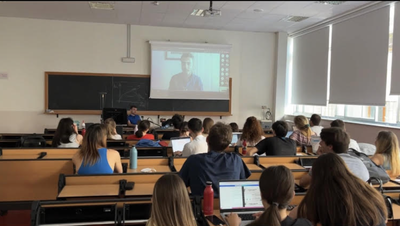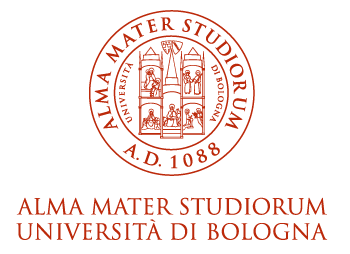The world of work explained by alumni to students
That the world of work is changing, constantly and suddenly, is now a fact. Today, the real challenge for universities is to establish solid fixed points around which to build a flexible and adaptable education to fulfil the ever-changing needs of students.
International Management, the Master's Degree of Alma Mater Studiorum - University of Bologna, has precisely this objective: to graft the skills most required by the labour market on rigorous theoretical foundations.
But not only.
To accompany students in this delicate transition from a class to the office, it is more necessary than ever to help students match their expectations and ambitions with the complexity of the real world. A concrete example is the course 'The Future of Work. How Companies Really Work and What they Search for in Job Candidates', a compass in the job market created by two alumni of the programme, Daniele Graverini and Carlo Sicoli.
What awaits students beyond the reassuring university walls is often little more than an idea. This vagueness, combined with a sense of urgency in 'finding one's path' given by a pressing competition between young talents, is more than most young graduates can manage on their own.
"The truth," Carlo shares, "is that those who study business economics leave university with little awareness of a fundamental factor, namely how a company is structured and how it works in its daily routine." In fact, just as a doctor knows every fibre of the human body, a management student should be familiar with all business roles and functions in a company.
"From this gap, which I felt personally, the idea for a course was born and immediately welcomed with great enthusiasm by the programme director Simone Ferriani. Together with Daniele, already involved with the mentorship project, we further developed 'The Future of Work' course," continues Carlo.
The initial idea evolved in a 6-session course included in the International Management study programme. It is designed to show students the world of work from the inside, involving those who can certainly best understand their doubts and perplexities, that is, the programme's alumni.
“It was important to provide students with an honest and timely overview of how companies work and what they are looking for in candidates,” adds Daniele. “Knowing what each department does and why, is essential to understand which sector you feel closest to. Then, having a clear idea of the skills and competencies most required to access the desired positions is the second step towards building a rewarding career."

The close bond between International Management students and alumni is probably one of the programme's greatest strengths. It is precisely the feedback from former students - trained in the same classrooms - which helps keep the programme in step with the transformations of the labour market.
"Involving alumni allows each generation to enrich the next one, and this has an incalculable value," says Daniele, founder with Lorenzo Bezzi of the Mentorship program for International Management, which annually creates 100 to 150 matches between alumni and students.
What are, in practice, the must-have skills today for those who make their entry into the world of work?
"Competition is increasing in all sectors, and the skills required are always different," replies Carlo. "But I believe that students need to focus on developing a transversal capacity that will never become obsolete: proactivity."
"I agree," Daniele confirms, "and I would add that proactivity must be 'trained' and stimulated by seizing all those opportunities capable of opening one's mind: internships, exchanges abroad, networking events, learning languages. Developing intercultural skills is now more fundamental than ever, as is having good emotional intelligence."
Knowing the environment in which you move makes it much easier to take the initiative and focus your efforts. And it is precisely here that the 'The Future of Work' course makes its valuable contribution to the training of International Management students.
"We decided to bring to the class those alumni who could present their vision 5, 10, or 15 years after graduation and share the paths they took, the mistakes they made and their doubts as students," Says Daniele. "It was also crucial that it was precisely our former students who shared their experiences. Students could easily recognize themselves in their stories."
As a result, 39% of students rated 'The Future of Work' as useful, and a roaring 55% as extremely useful.
'I learned about company areas that I did not know before' was one of the many feedbacks received. Or again: 'The speakers taught us to understand ourselves, find the right job, take risks and improve'.
But what in particular made the course formula so appealing to the participants?
Understanding the sectors in which International Management graduates can enter with greater success is one of the course's primary objectives, but not the only one. In addition to identifying the sectors, it is also necessary to know the company roles and, last but not least, the work tasks.
"Each lesson is different, dedicated to a specific business area. During the sessions, each area is analyzed in detail, including the expectations of employers when hiring candidates for positions in the sector," explains Carlo.
Students got the possibility to discuss Sales Operations with Gaetano Castellucci, Veeva Systems, and Leonardo Mainardis, Slack; Consulting with Livia Gianandrea, PwC, and Martina Gabrielli, Bain & Company; Tech Sales with Enrico Armilli, Amazon; Finance with Eleonora Mantovani, PROfounders Capital, and Sofia Boschetti, Goldman Sachs; Product Management with Chiara Quaglia, Zalando.
This scheme has allowed students to access much information on very different areas in a structured, way without putting aside the more personal and intimate side of building a career.
"During the last session, we invited Bianca Donati to share with the students a reflection on 'finding your why'," adds Daniele. In fact, in an increasingly competitive world, it is not uncommon to find yourself chasing standardized goals and thus losing sight of your aspirations. "Bianca's lesson inspired students to look inside them and understand that the final goal is their happiness, not a job title."
For the next academic year, Daniele and Carlo are already planning to improve the course further, aware of the importance of this moment of confrontation with real-life challenges. An in-depth analysis of the Marketing area, a discussion with HR experts and new international speakers are just some of the elements that will enrich the new edition.
"These generations of students have passed from one crisis to another, struggling to grow in a context of mounting pessimism", comments Daniele. "That's why the intent of 'The Future of Work' is also to help them see the opportunities beyond the difficulties, and there are many. The alumni they met during the course prove that an International Management graduate has all the credentials to succeed in Italy as in the world.
